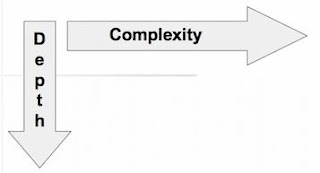I have always been a big fan of Sandra Kaplan
at the University of Southern California. She has created wonderful techniques
for increasing depth and complexity of curriculum—attributes that are at the
core of gifted education.
Kaplan’s chart, Facilitating the Understanding of DEPTH and COMPLEXITY
, presents teachers with easy-to-follow prompts, key questions, thinking
skills, and resources that provide ideas for differentiating curriculum. These
ideas can be applied to many subjects including language arts, science, social
studies, and math. The prompts and key questions are very helpful when
developing universal themes. A few examples include:
Prompt
|
Key Questions
|
Thinking Skills
|
Resources
|
Patterns
|
What are the reoccurring events?
What elements, events, ideas, are repeated over time?
What was the order of events?
How can we predict what will come next?
|
·Determine
relevant vs. irrelevant
·Summarize
·Make
analogies
·Discriminate
between same and different
·Relate
|
Timelines
Other chronological lists
|
Ethics
|
What dilemmas or controversies are involved in this
area/topic/study/discipline?
What elements can be identified that reflect bias,
prejudice, and discrimination?
|
·Judge with criteria
·Determine bias
|
Editorials
Essays
Autobiographies
Journals
|
Over Time
|
How are the ideas related between the past, present, and
future?
How are these ideas related within or during a particular
time period?
How has time affected the information?
How and why do things change or remain the same?
|
·Relate
·Sequence
·Order
|
Timelines
Text
Biographies
Autobiographies
Historical documents
|
View the entire chart at the link above and use it as a
guide when developing curriculum for the gifted or when differentiating lessons
in the regular classroom.

No comments:
Post a Comment
Your comments will be available after approval.